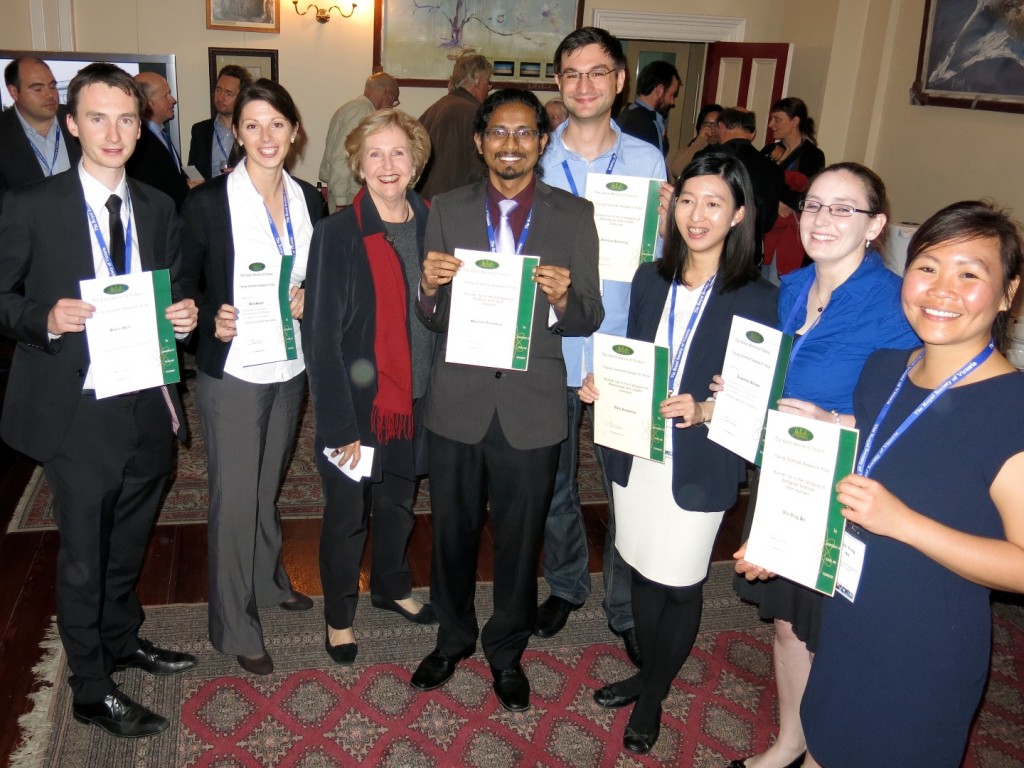Young Scientist Research Prizes – 2017 Competition
A National Science Week Event

To foster and recognise excellence in Victoria’s early career scientists, the Royal Society of Victoria has established four prestigious competitive prizes open to Victorian students in their final year of doctoral candidature, in all areas of the Biomedical & Health Sciences, Biological Sciences (Non-human), Earth Sciences and Physical Sciences.
Applications for the Prizes opened on 1 March, 2017 and closed on 31 May, 2017. Following assessment across the four categories, eight finalists have been selected to present to our audience on the evening of 17 August, 2017. Of these eight finalists, only four will win the prize of $1000 for their respective categories. The award is based on demonstration of the applicant’s excellence in scientific research, ability to communicate scientific information clearly and succinctly to an audience of scientists and members of the general public on their particular research field and to answer questions from the audience.
2017 Finalists
Physical Sciences:
Justine Corso, The University of Melbourne – “Damage and orientation in single molecule imaging using x-ray free-electron lasers”
Guoping Hu, The University of Melbourne – “Novel promoters for carbon dioxide absorption in potassium carbonate solutions”
Earth Sciences:
Nicolas Molnar, Monash University – “The unzipping of continents”
Alexander Norton, The University of Melbourne – “Observing photosynthesis from space: a novel technique using plant chlorophyll fluorescence measurements and a carbon cycle model”
Biological Sciences (Non-Human):
Bryant Gagliardi, The University of Melbourne – “Differentiating pollutant‐induced effects from non‐contaminant stress responses in aquatic midges (Diptera: Chironomidae)”
Perran Ross, The University of Melbourne – “Environmental impacts on the use of Wolbachia for arbovirus control”
Biomedical & Health Sciences:
Sarah Larcombe, Monash University – “New Insights into the pathogenesis of diverse bacterial species in non‐C. difficile antibiotic‐associated diarrhoea”
Joshua Newson, The University of Melbourne – “Salmonella effector proteins interrupt host cell death signalling”
Each of these short-listed candidates will be required to give a 15 minute oral presentation (10 minutes presentation, 5 minutes discussion) before a general audience of scientists and members at the Society on 17th August 2017 commencing from 6:30 p.m. The order of speaking is decided by ballot on the night. In addition to the merits of the methodology and significance of their scientific work, finalists will be judged on their ability to make their work accessible and interesting to an audience uninitiated in their field of endeavour.
Winners will be announced at a special function following the presentations at the Royal Society of Victoria’s Hall.
The presentations are open to fellow students, friends and families through invitation, as well as RSV Members and the general public through this registration service.
The Biological Sciences (Non-human) prize and Earth Sciences prize are generously supported by donations from the families of previous Royal Society Presidents: Edmund D Gill and Neil Archbold respectively. We also gratefully acknowledge the generous support of Dr S Max Richards AM and Mrs Margaret R Richards, commencing from 2017.







